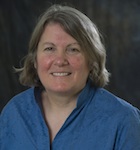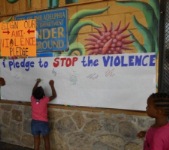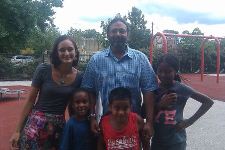Opening Doors Students Help a Community Heal
 As part of the Drexel University School of Public Health’s Opening Doors Health Disparities Research Training program, students Samantha Rivera and Ricca Prasad spent the summer working with Dr. Marcia Polansky on a project helping Philadelphia’s Strawberry Mansion neighborhood. Provided in conjunction with the East Park Revitalization Alliance (EPRA), the project focused on group interventions that would help the community recover from violence.
As part of the Drexel University School of Public Health’s Opening Doors Health Disparities Research Training program, students Samantha Rivera and Ricca Prasad spent the summer working with Dr. Marcia Polansky on a project helping Philadelphia’s Strawberry Mansion neighborhood. Provided in conjunction with the East Park Revitalization Alliance (EPRA), the project focused on group interventions that would help the community recover from violence.
Polansky, an associate professor at the DUSPH and a social worker, partnered with Dr. Suku John, Executive Director of EPRA, after hearing about how the Strawberry Mansion community was affected by violence.
“It seemed like every week there was some loss to violence in the neighborhood. Suku really wanted us to work on something to help with the trauma,” said Polansky.
 Luckily, Rivera, MPH ’12, who recently graduated from the DUSPH’s full-time MPH degree program, had taken a course with Dr. Sandra Bloom, who created and developed the Sanctuary Model, which is a trauma-informed method for addressing trauma. Primarily geared for use in structured organizations, such as schools, hospitals or businesses, Rivera and Polansky adapted the Sanctuary Model for EPRA and the surrounding community.
Luckily, Rivera, MPH ’12, who recently graduated from the DUSPH’s full-time MPH degree program, had taken a course with Dr. Sandra Bloom, who created and developed the Sanctuary Model, which is a trauma-informed method for addressing trauma. Primarily geared for use in structured organizations, such as schools, hospitals or businesses, Rivera and Polansky adapted the Sanctuary Model for EPRA and the surrounding community.
Following the Sanctuary Model’s S.E.L.F. curriculum (Safety, Emotions, Loss, and Future), Rivera led a group of eight adults in weekly workshops addressing different topics of trauma.
“The goal of this was to create that community cohesion. Traumatic things happen and everyone’s going the through the same thing at once, but nobody felt like they could talk to each other about it. We created a safe space for them,” Rivera said. Getting residents from the community to participate and return weekly was difficult. Transportation, babysitting, and work were all issues Rivera had to contend with.
“Recruitment and retention were the biggest challenges. What worked was that people tend to come to things when they know somebody. They came to depend on each other to be there. And those people stayed and were the consistent people there,” said Rivera. For Ricca Prasad, a BS/MPH candidate at George Washington University, the focus was on the community children. Prasad also organized art classes a few times a week to help the children communicate and express themselves, while she got to know the community better.
 “It let them work on putting emotions into pictures and words, because that’s one of the huge problems with the violence in the community—the children don’t learn other ways to express their emotions so they often act out in violent ways,” said Prasad.
“It let them work on putting emotions into pictures and words, because that’s one of the huge problems with the violence in the community—the children don’t learn other ways to express their emotions so they often act out in violent ways,” said Prasad.
“It’s amazing how well the art classes worked,” said Polansky. “It got the kids wanting to draw, but also explain in words what they had drawn and why they felt the way they did.”
“Hopefully it got them to think about things that maybe people don’t generally ask them and that they may not think that anyone cares to hear their response to,” Prasad added.
Polansky hopes the students gained experience by growing with a community.
“I hope that they have a more realistic view of the issues so they can really help,” she said. “They’ve all kept their empathy and are appreciative of what the community is facing. They have a real relationship with the people they’re helping.”